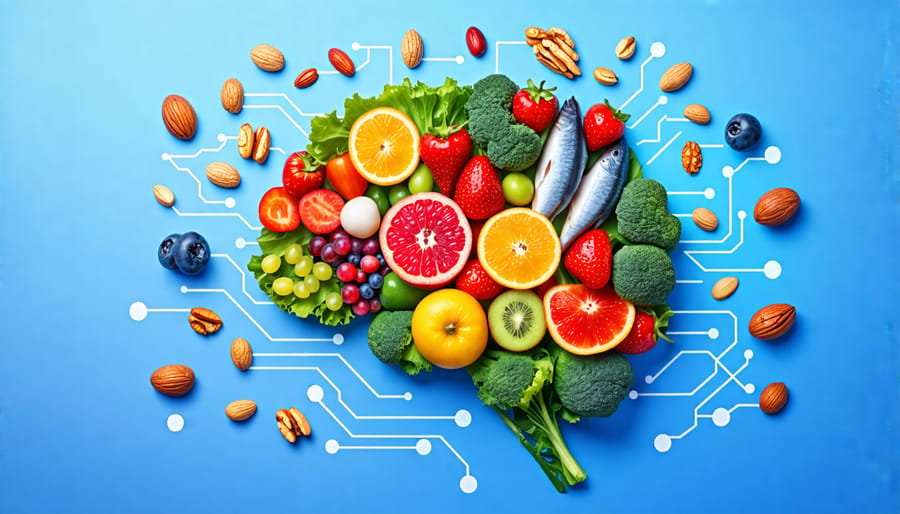
“Food is fuel” is a phrase we hear often, but it doesn’t just apply to physical performance—it also affects how we feel emotionally and mentally. The foods you eat directly influence your brain chemistry, hormones, and energy regulation. In other words, your diet plays a powerful role in shaping both your mood and your daily energy levels. Understanding this connection can help you make smarter food choices that support overall well-being.
The Brain–Gut Connection
The gut is often called the “second brain” because of its direct communication with the central nervous system. This connection, known as the gut-brain axis, means that what you eat can impact neurotransmitters—chemical messengers like serotonin, dopamine, and GABA that regulate mood, focus, and relaxation. About 90% of serotonin, the “feel-good” hormone, is produced in the gut. When your gut health is supported by nutritious food, your brain receives the benefits.
On the flip side, diets high in processed foods, sugar, and unhealthy fats can disrupt gut bacteria, leading to inflammation, mood swings, and fatigue. This is why improving nutrition often brings noticeable improvements in emotional balance and energy.
Nutrients That Boost Mood
Certain vitamins and minerals are closely linked to mental health and emotional stability.
- Omega-3 Fatty Acids: Found in fatty fish, chia seeds, and walnuts, omega-3s help reduce inflammation and support brain cell communication. They are linked to lower rates of depression and improved focus.
- B Vitamins: Vitamins like B6, B12, and folate play a crucial role in producing neurotransmitters. A deficiency can lead to fatigue, irritability, and even depressive symptoms.
- Magnesium: Known as the “relaxation mineral,” magnesium helps calm the nervous system. Foods like spinach, almonds, and dark chocolate are excellent sources.
- Vitamin D: Low vitamin D levels have been associated with seasonal depression and low mood. Exposure to sunlight and vitamin D-rich foods like eggs and fortified products can help.
Foods That Impact Energy Levels
Your energy depends largely on how your body processes the foods you eat. The type and balance of nutrients make a big difference.
- Complex Carbohydrates: Whole grains, oats, quinoa, and sweet potatoes provide slow-releasing energy, keeping blood sugar stable and preventing energy crashes.
- Proteins: Lean meats, beans, eggs, and tofu provide amino acids that are building blocks for neurotransmitters and help sustain energy throughout the day.
- Healthy Fats: Avocados, nuts, seeds, and olive oil supply long-lasting energy and support brain function.
- Hydration: Even mild dehydration can cause fatigue, brain fog, and mood dips. Drinking enough water is as important as food for energy and mental clarity.
The Role of Blood Sugar Balance
Unstable blood sugar is one of the biggest causes of mood swings and low energy. Eating sugary snacks or processed foods can cause a quick spike in blood sugar, followed by a crash that leaves you tired and irritable. By combining protein, fiber, and healthy fats with carbohydrates, you can stabilize blood sugar and maintain steady energy and mood. For example, pairing fruit with nuts or yogurt helps prevent the crash that comes from eating fruit alone.
Lifestyle Factors That Amplify Nutrition’s Effects
While nutrition is central, it works best when combined with other healthy habits:
- Regular Exercise: Movement increases blood flow to the brain and enhances the effects of a nutrient-rich diet.
- Sleep Quality: Poor sleep affects hunger hormones, leading to cravings for sugary, processed foods that harm mood and energy.
- Mindful Eating: Slowing down and appreciating meals improves digestion and nutrient absorption, strengthening the brain–gut connection.
Conclusion
The connection between nutrition, mood, and energy is undeniable. By choosing foods rich in essential nutrients, balancing blood sugar, and supporting gut health, you can experience greater mental clarity, emotional stability, and lasting vitality. Good nutrition isn’t just about looking after your body—it’s about fueling your mind and spirit, too. Small, consistent changes in your eating habits can transform how you feel each day, creating a foundation for long-term wellness and productivity.
Leave a Reply